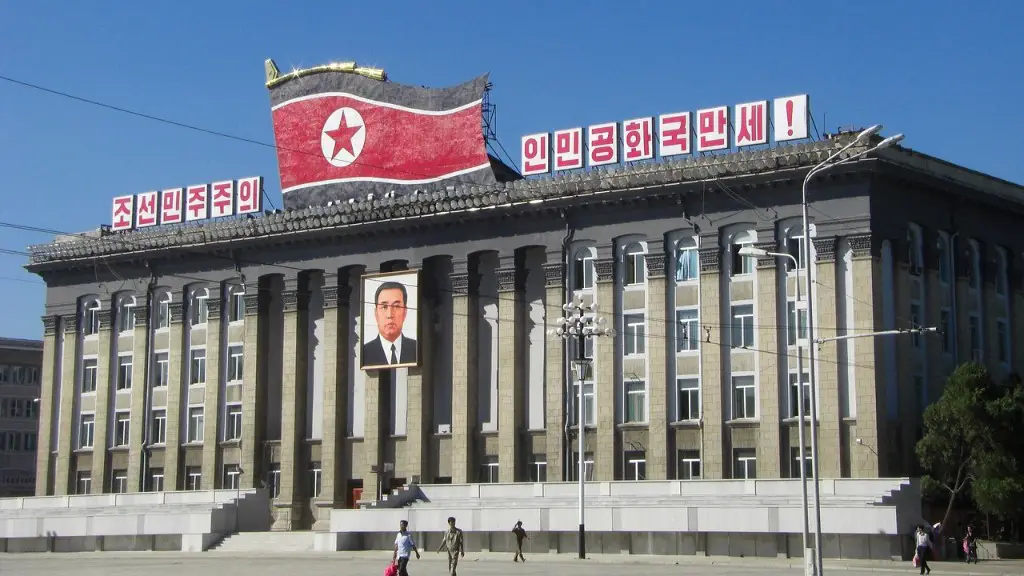Background Information
China and North Korea have been allies since 1950, when the Chinese Communist Party joined forces with the North Korean Communist Party during the Korean War. Since then, the relationship between the two countries has remained strong, and China has provided North Korea with economic and diplomatic support. China is North Korea’s main trading partner and has helped to prop up the country’s economy. China’s ties to the North Korean regime have been an international issue since the country’s pursuit of nuclear weapons; critics have long argued that China should be more active in pressuring the North Koreans to end their nuclear program.
Chinese Perspective
From the Chinese perspective, intervening in North Korea poses several risks. North Korea is a small, unstable country with an unpredictable government, and any move by China to intervene could cause unforeseen consequences. Additionally, North Korea’s nuclear weapons program is a security threat for China; if North Korea is attacked, any nuclear fallout could spread to China. As a result, China is likely to be cautious when considering any action in North Korea.
International Pressure
In recent years, international pressure on China to take action in North Korea has increased significantly. The United States, in particular, has pushed China to take a stronger stance on North Korea and use its economic leverage to push for change. China has been reluctant to do so, however, citing a fear of sparking conflict.
Will China Intervene?
It is difficult to predict whether or not China will intervene in North Korea. While China has been reluctant to take direct action, it has in the past encouraged North Korea to pursue diplomatic solutions. For example, in 2018, China helped to broker a joint summit between the US and North Korea, a move that was seen as a positive sign of China taking a more active role in international negotiations.
Pros of Intervening
Intervening in North Korea could have many positive outcomes. It could open the door for diplomatic conversations, decrease tensions and potentially lead to the denuclearization of the peninsula. Additionally, increased political stability in North Korea could lead to increased economic opportunity and growth, which would be beneficial for both countries.
Cons of Intervening
Intervening in North Korea could also cause a number of problems. It could lead to conflict between China and North Korea, as well as with other countries, including the United States. Additionally, North Korea has a volatile government, and any sudden changes could lead to unpredictable outcomes.
Balancing Act
It is clear that China is walking a tightrope when it comes to North Korea. On one hand, China has an interest in maintaining a strong relationship with North Korea, as the two countries have had a long-standing alliance. On the other hand, China is under increasing international pressure to do more to address North Korea’s nuclear weapons program. Ultimately, it is difficult to predict whether or not China will intervene in North Korea.
Impact of US
The United States has been critical of China’s relationship with North Korea and has pushed for more action. How China will ultimately handle US pressure is still unclear, as Chinese leaders have expressed their desire to maintain diplomatic ties with the United States. The US has also threatened to use economic sanctions or other measures to force China to take action in North Korea.
Impact of Japan and South Korea
Japan and South Korea have also expressed concerns about North Korea’s nuclear weapons program and have placed pressure on China to act. Japanese Prime Minister Shinzo Abe recently called for China to do more to address North Korea’s missile program, a call echoed by South Korean President Moon Jae-In. How China will ultimately handle such pressure is uncertain, and it remains to be seen whether or not China will ultimately intervene in North Korea.
Domestic Related Issues
China’s actions in North Korea could also have domestic implications. Any action in North Korea could be interpreted by the Chinese people as a sign that the Chinese government is taking a more active role in international affairs. This could have both positive and negative consequences, as some citizens may view this as a sign of a stronger, more engaged Chinese government, while others may see it as a sign of Chinese aggression.
Economic Considerations
Economic considerations are also likely to play a role in China’s decision-making process. North Korea is an economically impoverished nation and any economic assistance or investments by China would require a great deal of resources. Additionally, a decision to intervene could scare away potential foreign investors, as they may become wary of the instability a potential intervention could bring.
Regional Stability
Increasing regional stability is also often cited as a key factor in determining whether or not to intervene in North Korea. China is likely to be wary of any action in North Korea that could lead to increased regional tension, and it is unlikely that China would take any action if the potential risks outweigh the potential rewards.
Military Action
China has long been opposed to the use of military force in North Korea, as it could lead to conflict and regional instability. As such, it is unlikely that China would seek to intervene militarily in North Korea.
Diplomatic Solutions
Finally, diplomatic solutions are likely to be the preferred option for China. China is likely to push for negotiations and diplomatic talks as the most viable solution to the North Korean issue. China’s leaders will likely try to find a peaceful solution to the issue, as they are likely to be wary of any escalation of tensions in the region.



